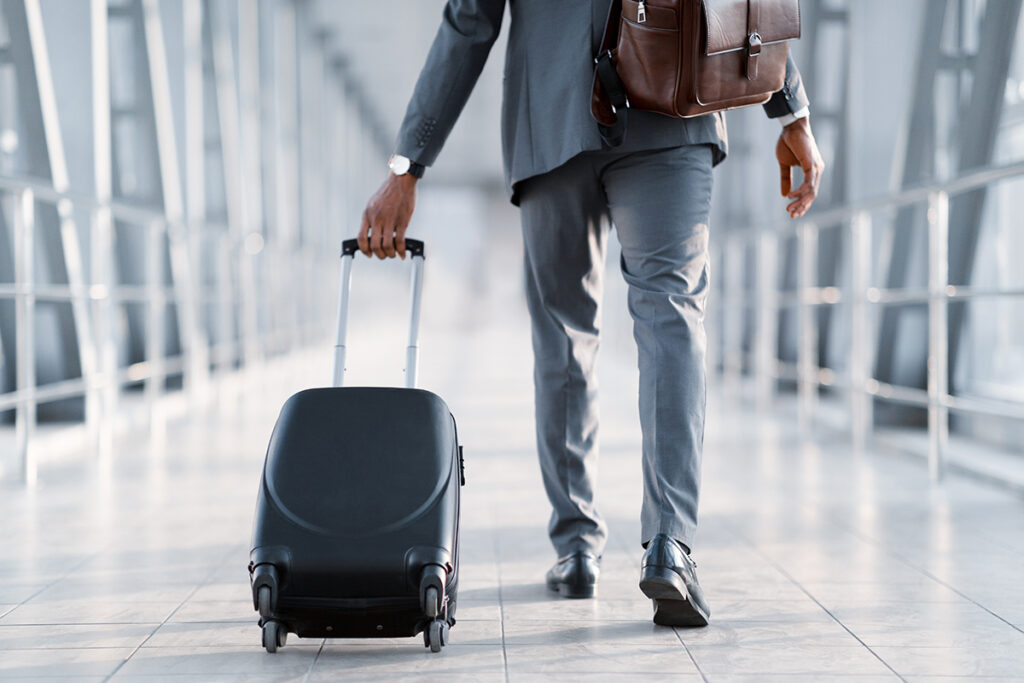Mr. Gbenga had always dreamed of seeing the world, but his travel experiences had a way of turning into financial disasters. Every trip he went on, he’d start off excited, booking his flights and accommodations with a grin, picturing himself lounging on foreign beaches or hiking through misty mountains. But the excitement faded fast. By the end of every trip, he’d find himself staring at his bank account in disbelief, wondering how he managed to burn through his money so quickly. The dream vacations kept becoming expensive nightmares.
The problem was simple, but he didn’t realize it at first—he never budgeted. For Mr. Gbenga, planning was all about booking flights and grabbing his passport. He’d think, “I’ll figure out the rest when I get there!” That spontaneity felt thrilling, but once he was on the ground, things quickly went sideways. With no clear budget, he’d splurge on fancy dinners, overpriced souvenirs, and last-minute tour tickets that cost twice what he expected. And then there were the hidden costs he hadn’t even considered: taxis, tips, extra baggage fees, and exchange rates that didn’t work in his favor.
One particular trip to Paris ended up being a wake-up call. He’d wanted to visit the Eiffel Tower, take a river cruise, and explore all the famous museums, but without budgeting, he quickly ran low on cash. He ended up skipping the cruise altogether and had to settle for photos outside the museums instead of going in. Worse yet, his flight back got delayed, forcing him to spend extra on a last-minute hotel room. By the time he was home, his bank account was totally empty.
The regret was overwhelming. He’d had to cut corners on what was supposed to be a dream trip, and the unexpected costs left him scrambling. It was after this experience that he started searching for answers. That’s when he stumbled across budgeting articles specifically for travelers. He saw tips on planning for every expense—from transportation to meals to souvenirs—and learned how even setting aside a little extra could help him handle the unexpected. These articles showed him how budgeting didn’t mean missing out; it meant enjoying his trip with peace of mind.
Armed with his newfound budgeting skills, he planned a trip to Morocco. This time, he created a detailed budget, accounting for every activity he wanted to try, with a buffer for surprises. The result? He had the time of his life without the dreaded financial panic. For the first time, he came back with memories instead of money regrets. Mr. Gbenga’s travels now are full of joy and adventure, all thanks to a little planning and those budgeting tips that changed everything.
Traveling is an exciting escape, but the expenses can add up quickly, often stopping potential travelers from exploring. Budgeting effectively doesn’t mean sacrificing memorable experiences; it’s about planning smartly so you can enjoy each adventure to the fullest without emptying your wallet. Whether you’re planning a weekend journey or a month-long journey, understanding how to budget for travel can make all the difference.
14 Tips on How to Budget your Travel without Breaking your Bank

Here are common tips on how to budget for travel in a way that is both financially sustainable and enjoyable.
1. Plan Your Travel Budget with Clear Goals
When it comes to budgeting for travel, setting clear goals is crucial. Consider where you want to go, how long you’ll stay, and what experiences matter most. Having clear answers to these questions will make it easier to allocate your funds wisely. For instance, if your main goal is sightseeing, prioritize a destination known for affordable attractions rather than splurging on a luxury stay.
Defining goals helps set a solid framework. Each trip is unique, and personal priorities play a big role. Knowing if you’re after adventure, relaxation, or cultural exploration will help you focus your spending on what’s most meaningful.
2. Choose Destinations That Fit Your Budget
Choosing the right destination can save a surprising amount of money. Some places are naturally more budget-friendly due to lower costs of living, fewer travel restrictions, or a favorable exchange rate. Locations like Southeast Asia, parts of Eastern Europe, or Central America are known for being affordable while offering rich cultural experiences.
Researching destinations within your budget not only helps financially but can also lead to discovering hidden gems. Many lesser-known locations offer beautiful scenery, vibrant culture, and excellent food at a fraction of the cost of popular tourist spots.
3. Set a Realistic Travel Budget and Stick to It
A travel budget isn’t just a list of costs; it’s a guideline that prevents unnecessary spending. Start by estimating the expenses you’ll encounter—flights, accommodations, meals, transportation, and activities. Once you have a general idea, set a maximum amount you’re comfortable spending.
Make sure this budget reflects your income and doesn’t interfere with your regular expenses. It’s tempting to dip into savings for an extra excursion, but sticking to your budget ensures you’re financially comfortable both during and after the trip.
4. Be Smart with Flights and Transportation
Flights can be one of the biggest expenses when traveling, so it pays to be strategic. Use fare comparison websites like Skyscanner or Google Flights to find the best deals. Consider flexible dates, nearby airports, and layovers to get lower prices.
Public transportation is another great way to cut costs. Instead of taxis or ride-sharing apps, look into buses, trains, or even bikes and scooters. In many cities, public transport is efficient, cheap, and offers a more local perspective of the area.
5. Ensure you Budget on Accommodation : Options Beyond Hotels
Hotels are convenient, but they’re not the only accommodation option. Hostels, guesthouses, and Airbnb rentals often provide excellent value and can significantly reduce costs. Many travelers overlook budget-friendly alternatives like couchsurfing or house-sitting, which can even provide free accommodations.
If comfort is a concern, consider booking smaller, locally-owned properties or short-term rentals that often come with kitchen facilities, allowing you to prepare meals rather than eating out every day. This adds both flexibility and savings to your stay.
6. Create a Food and Dining Budget
Food can be a major expense, especially if you’re dining out frequently. A great way to save is by shopping at local markets and preparing some of your meals. This not only cuts down on restaurant bills but also allows you to experience the region’s culinary culture.
Look for local eateries rather than tourist-targeted restaurants, which often have inflated prices. Street food and family-owned diners are typically affordable and offer authentic cuisine, making your dining experience both economical and memorable.
7. Plan Activities Wisely and Take Advantage of Free Options
Traveling doesn’t always have to mean expensive activities. Many destinations offer free attractions like museums, parks, or walking tours. Research in advance to find free or low-cost events such as festivals or local gatherings, which can enrich your travel experience without adding to your expenses.
If there’s a pricier activity you don’t want to miss, consider balancing it by choosing free or low-cost activities on other days. Many cities have discount passes that cover multiple attractions for a lower overall price.
8. Consider Travel Insurance
Skipping travel insurance may seem like a way to save money, but the consequences of an unexpected emergency can be financially draining. Travel insurance covers unexpected incidents like medical issues, trip cancellations, or lost luggage, which can provide peace of mind. Look for affordable insurance options that fit your needs rather than opting for a high-end policy.
9. Budget for Souvenirs and Personal Expenses
It’s easy to get swept up in the excitement of buying souvenirs for yourself or friends. However, these purchases can quickly add up. Setting a modest budget for souvenirs helps avoid overspending. Consider buying unique but affordable items like postcards, magnets, or locally crafted items that carry the spirit of the place without breaking the bank.
10. Use Travel Apps and Tools
Today’s travelers have a wealth of digital tools to help with budgeting. Apps like Trail Wallet or TravelSpend can track expenses, while booking apps like Hopper can alert you to flight price drops. Currency converters, language translation tools, and maps can also reduce the costs and stress of unexpected situations.
Having the right digital tools on hand allows you to make informed decisions in real-time, saving both money and time while on the road.
11. Plan for Unexpected Expenses
No matter how carefully you budget, unexpected expenses are almost guaranteed. This could be anything from a missed bus to an unplanned meal. Setting aside an emergency fund for such instances is essential to ensure that small hiccups don’t disrupt your entire budget.
Keeping a small amount of cash in the local currency can also come in handy for minor emergencies, particularly in places where credit cards aren’t widely accepted.
12. Take Advantage of Loyalty Programs and Discounts
Frequent travelers often benefit from loyalty programs that offer perks and discounts. Airlines, hotel chains, and even some booking sites have programs that reward repeat customers with points, discounts, or upgrades. Signing up for these programs is free and can make a difference on future trips.
Student and senior discounts are also widely available and can offer substantial savings. Don’t hesitate to ask if discounts apply—you might be surprised at how often they’re available.
13. Track Your Spending Throughout the Trip
It’s easy to lose track of spending once you’re on the go. Keeping a daily record of your expenses helps you stay on budget. Many travelers use a simple spreadsheet or an app to track daily expenditures. By staying mindful of what you’re spending, you can make adjustments in real-time and avoid running out of money before the trip ends.
14. Stick to Your Financial Plan After Returning
After a fantastic trip, it’s tempting to dive into planning the next one. Take some time to review your budget and spending. Were there areas where you overspent? Are there adjustments you could make for future travels? Reflecting on your spending can make future trips even more budget-friendly.
Wrapping Up
Traveling on a budget is about making wise choices when travelling. By planning strategically, prioritizing experiences, and embracing cost-effective options, you can have unforgettable adventures without breaking through your bank. From choosing budget-friendly destinations to tracking expenses daily, these tips allow you to travel often and with confidence. So start planning, pack your bags, and discover just how far your budget can take you.
Frequently Asked Questions (FAQs)
Here are answers to frequently asked question that you might find helpful to you.
What Are Some Common Mistakes to Avoid When Budgeting for Travel?
One of the biggest pitfalls is not setting a clear budget in the first place. People often overlook essential expenses like local transportation, tips, or entry fees for attractions. Another common mistake is ignoring exchange rates and transaction fees, which can add up when using a credit card abroad. Travelers also tend to overestimate how much they’ll save on food by cooking or going local, so having a more realistic food budget helps. Finally, avoid last-minute bookings, as they usually come at a premium.
How Can I Save Money on Transportation During My Trip?
Opt for local public transportation instead of taxis or rideshares, as it’s usually far more affordable. Many cities offer transportation passes or discounts for tourists, so look for those options. Walking or renting a bike is often free or inexpensive and a great way to explore. Also, look for local apps that may offer discounts on public transport fares. If you’re visiting multiple cities, consider regional passes or discounts on trains or buses, which are often cheaper than flights.
Is It Cheaper to Book Accommodation in Advance or at the Last Minute?
It generally depends on the destination and time of year, but booking accommodation in advance usually secures better rates, especially in popular areas. Last-minute deals may work in less tourist-heavy places or during off-seasons, but they’re not always reliable. For high-demand destinations, advance bookings also provide more choices for budget options like hostels, vacation rentals, or budget hotels. Booking in advance also gives you peace of mind, especially during peak travel seasons.
How Can I Save on Food Costs Without Sacrificing Local Experiences?
One great strategy is to eat where locals eat—local food stalls and markets often offer delicious, authentic meals at lower prices. Choose meals strategically by making breakfast the primary meal of the day, as many accommodations offer it free. Buying snacks and essentials at local grocery stores is also a smart way to avoid pricey restaurant bills. Many cities also have free or low-cost food tours where you can sample traditional dishes without overspending.
What Are Some Ways to Save Money on Travel Insurance?
Comparing different insurance providers is the best way to find affordable yet comprehensive coverage. Sometimes, your credit card company may offer travel insurance if you book your trip using their card. Another option is to consider insurance packages for multiple trips if you’re a frequent traveler. Be sure to review policies carefully to make sure they cover essential elements like medical emergencies, theft, and cancellations. You can also check for discounts through membership programs or loyalty points.
Can I Use Travel Credit Cards to Save Money While Traveling?
Absolutely! Travel credit cards often offer rewards points, miles, or cash-back bonuses on travel-related expenses, which can help offset costs. Many travel cards also come with perks like free checked bags, travel insurance, and no foreign transaction fees. Some cards provide sign-up bonuses that can be redeemed for flights or hotel stays. Just ensure that you pay off your balance monthly to avoid interest fees that could cancel out your savings.
How Can I Manage Unexpected Expenses During My Trip?
It’s essential to have a small buffer in your budget, reserved for emergencies or unforeseen expenses. Keep an emergency fund in cash or a separate savings account you can access while abroad. Apps like Trail Wallet or PocketGuard can help monitor your expenses, allowing you to adjust your budget on the go if something unexpected comes up. Prioritize your spending and cut back on non-essential items if you find yourself running low on funds.
Should I Exchange Currency Before Traveling, or Wait Until I Arrive?
Exchanging currency in advance can be beneficial, especially if your local bank offers a favorable rate with minimal fees. Alternatively, you can use ATMs at your destination, which often provide good rates. Avoid currency exchange kiosks in airports, as they often have higher fees. Some travelers opt for multi-currency cards or travel cards that can be loaded with foreign currency in advance to save on exchange costs.




